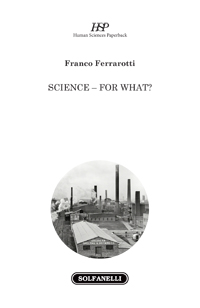| Edizioni Solfanelli |
Catalogo
|
| COLLANA |
Human Sciences Paperback
|
| L'AUTORE |
Bio-Bibliografia
|
|
|
|

Present day sociology is usually referred to as a «scientific sociology». No doubt that the esprit polytechnicien is prevailing. But science has undergone a drastic specialization whereby we can distinguish between «demonstrative» and «interpretative» sciences. Among the interpretative sciences, sociology and history can be considered twin-sisters because they are both concerned with man in society. But, while history is based on causal interpretation, sociology aims at building comparative typologies. What seems to unite all the sciences — «natural» and human sciences — is the issue of the political use of their eventual findings. No «axiological neutrality» seems to be tenable. The idea of Max Weber’s «Wertfreiheit» has been largely misunderstood.
[ISBN-978-88-3305-154-3] |
Iscriviti alla nostre 

